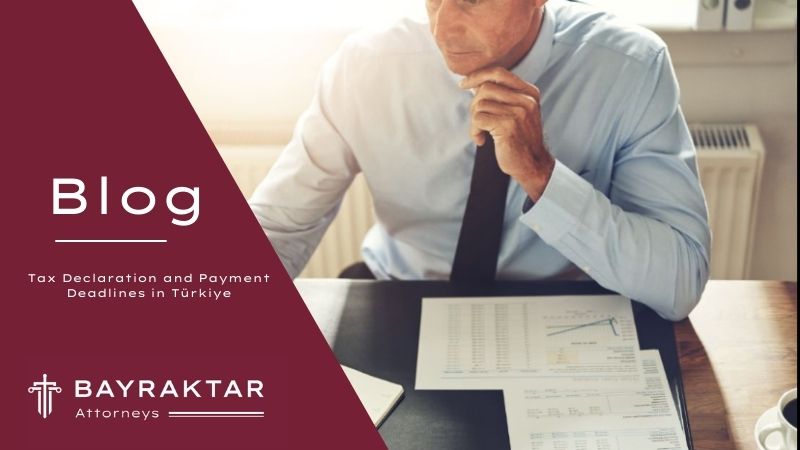
Business Executives’ Personal Responsibility Stems From Tax Penalties in Turkey
In Türkiye, business executives may face personal liability for certain tax-related penalties incurred by their companies. Under Turkish tax law, if a company fails to fulfill its tax obligations (such as failing to file returns, underreporting income, or not paying taxes due), the Tax Administration has the authority to pursue not only the legal entity but also its executives, particularly members of the board of directors or authorized signatories. This personal responsibility arises when the tax debt cannot be collected from the company’s assets, and it may result in the executive being held jointly liable for the unpaid taxes, interest, and fines. As a result, business leaders must ensure strict compliance with tax regulations to avoid personal financial consequences.
Can Shareholders Hold Liable For Tax Fines Imposed On Corporate Companies?
The board members and corporate executives of Joint-Stock Companies and Limited Liability Companies in Turkey might be held liable for tax fines and their associated public claims emerging from tax investigations or administrative transactions of the tax authorities. In another expression, board members in Joint-Stock Companies and business executives in Limited Liability Companies can be held personally liable for tax fines levied on the firm and become accountable for their own wealth. In our blog on this topic, we will discuss the limitations and constraints of this principle.
Officers and shareholders of limited liability companies are liable for tax penalty notifications. Article 35 of Law No. 6183 on the Collecting of Public Claims stipulates that firm executives in Limited Liability in proportion to their original capital contribution to the firm, companies are responsible for the collection of claims addressed to the company if the unfruitful activity is proven by the conclusion of seizure of wealth procedures. The execution and collection processes are carried out in accordance with the aforementioned law.
In accordance with Article 35 of the same Law on the Collection of Public Claims, shareholders are likewise liable for collection.
On the other hand, shareholders and corporate executives in a Limited Liability Corporation are held accountable for tax fines under the “responsibility without fault” principles of Turkish law. The procedures that are to be performed by the Tax Authorities are not related to their performance of other responsibilities pertaining to the corporation.
In the application of Turkish law, it is typical to meet a payment order sent to a firm partner or executive. These orders of payment are written in the names of these executives and implemented by confiscation orders for their personal assets.
To hold these corporate leaders or owners accountable for tax fines, the Turkish Council of State and the aforementioned Legislation stipulate certain requirements and restrictions. Upon application to the Turkish courts, court orders can be issued expeditiously to cancel/remove payment orders that are created without following the standards outlined in these articles.
According to these terms, legal entities and persons owning shares in the business are legally accountable for tax penalties and payments arising from the firm’s prior fiscal quarters. To regard a shareholder/partner of a company or a company executive accountable for these Public Claims, the firm must first send and receive the order of payment made by the Tax Authority in accordance with the notification law.
The payment instructions must include a clear declaration that the executive/partner of the firm will be held accountable for any public accusations made against the company. Following receiving stated payment orders, the recipient has the option to either contest them or accept them without a challenge from the liable firm.
In addition to ensuring that the recipient of the notice is the correct person, the timing of the communication must also be monitored. In line with Law on Collection of Public Claims Article 54, 55, and subsequent articles, the legal entity representing the firm (the legal personality of the company itself) must be included in execution processes performed by the Tax Authority after this investigation. These actions consist of an investigation of the company’s assets, and confiscation proceedings, and ultimately prove fruitless.
Eventually, the Tax Authorities might hold corporate shareholders or executives accountable and initiate execution actions against them. In these processes, there is no order of responsibility between business leaders and shareholders, but firm executives are accountable for the debts with full ownership of all their properties/assets, while stockholders may face the same risk.
If these conditions and requirements that are stipulated and imposed upon the Tax Authorities for the granting of personal liability are not satisfied, the orders of payment may be brought before the Turkish Tax Courts.
Shareholder and Board Member Responsibility for Tax Penalties in Joint-Stock Businesses
In accordance with the Turkish Commercial Code, joint-stock company shareholders in Turkey are solely accountable for their original capital contribution debts. Thus, there are no regulations indicating that the shareholders of a joint-stock firm are liable under the Law on the Collection of Public Claims or any other law. Thus, execution/confiscation procedures cannot be initiated against the personal property and assets of joint-stock company owners.
Yet, under Article 35 of the Law on the Collection of Public Claims, board members of a joint-stock company may be susceptible to execution/confiscation procedures arising from payment orders aimed at the joint-stock company that ultimately prove futile.
Our remarks about the liability of firm executives in Limited Liability Companies will apply in this instance. Thus, for the Tax Authorities to pursue the confiscation of personal property, the aforementioned rules must be met. When these prerequisites are satisfied, payment orders must demonstrate that the corporation is unable to collect tax penalty obligations. The obligation of a board member is limited to debts incurred during the time he was actively performing his duties as a board member. In this regard, establishing the roles and responsibilities of executives through well-structured firm paperwork is essential for corporate compliance concerns.
Final Thoughts
According to the Law on Collection of Public Claims, as described in detail above, the liabilities from public claims and debts that could not be collected solely from the assets of a Limited Liability Company or a Joint-Stock Company can be assigned to a company executive, company shareholder, or board member.
Orders of payment issued to secure the collection of these payments can only be sent to the aforementioned company executives if specific prerequisites are completed and the firm’s assets are insufficient to collect the tax penalties/debts in full.
Legally received challenges to these orders can be filed with the Executive Directorate (Turkish: İcra Müdürlükleri) until they are completed. In Turkey, challenges may be filed with an authorized Tax Court following the finalization of orders of payment, cancellation of challenges, or expiration of a time limit. This court also has jurisdiction over disputes involving these payment orders and the resulting legal relationships.
If you are facing legal issues in Turkey, it’s important to have a reliable and experienced attorney on your side. Bayraktar Attorneys is a reputable law firm in Istanbul with a team of experienced lawyers who specialize in various areas of law, including commercial law, corporate law, intellectual property law, and more. We provide personalized legal services and can help you navigate complex legal issues effectively. Contact Bayraktar Attorneys today to schedule a consultation and get the legal representation you need.
Recently Added Blogs






.png)
